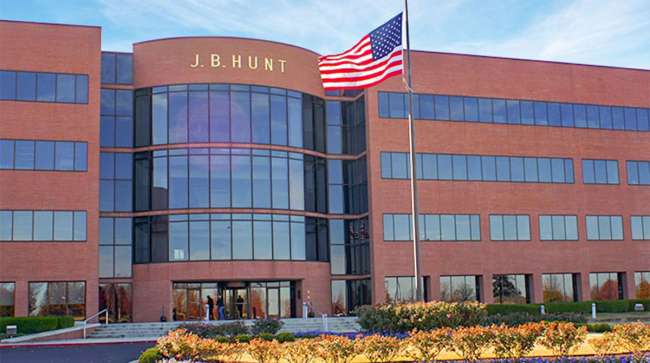Staff Reporter
J.B. Hunt Reports Year-Over-Year Declines for Q2

[Stay on top of transportation news: Get TTNews in your inbox.]
J.B. Hunt Transport Services experienced a year-over-year decline in earnings and revenue during the second quarter, the company reported July 18.
J.B. Hunt ranks No. 3 on the Transport Topics Top 100 list of the largest for-hire carriers in North America and No. 5 on the TT Top 100 list of the largest logistics companies.
The Lowell, Ark.-based carrier posted net earnings of $189.6 million, or $1.81 a diluted share, for the three months ending June 30. That compared with $255.3 million, or $2.42, during the same time the previous year. Total revenue decreased 18% to $3.13 billion from $3.84 billion.
“We maintain our perspective that all segments present meaningful growth opportunities,” CEO John Roberts said during a call with investors. “As you have heard us say consistently and for quite some time now, we remain committed to our investments and managing the business for the long term. The investment spans across our company foundations, including our people, our technology and our capacity.”
J.B. Hunt noted the decline in revenue primarily was driven by changes in customer rate, freight mix and lower fuel surcharge revenue. This resulted in lower revenue per load across some of the segments. The Marketplace for J.B. Hunt 360° also experienced a 40% decrease in freight transactions to $336 million from $556 million in the prior-year quarter.
“We have a large addressable market and meaningful opportunity to provide unparalleled service and value to our customers across our complementary portfolio,” Roberts said. “We remain in pursuit of being better prepared to meet the growing needs of our customers while staying disciplined on our costs and relying on our vast experience in the business.”
The results were below Wall Street’s expectations; analysts had been looking for $1.97 per share and quarterly revenue of $3.35 billion, according to Zacks Consensus Estimate.
Today we issued our second quarter earnings. Watch this video to hear more from our President, Shelley Simpson. To read the full earnings press release visit https://t.co/7ismkTVkv4. https://t.co/nYa611a11H — J.B. Hunt 360 (@jbhunt360) July 18, 2023
• Truckload revenue decreased 16% to $191.8 million from $227.9 million during the 2022 period. This was primarily because of a 20% decline in revenue per load that partially was offset by a 6% increase in load volume. Trailer turns in the quarter were down 20% from the prior period primarily due to freight mix and weaker overall freight demand.
Operating income for the truckload segment decreased 81% to $3.8 million from $20 million. This was primarily driven by the decline in revenue. The report noted operating margin declined year-over-year as a result of maintaining levels of investment in the network and technology as well as equipment and maintenance expenses.
• Final-mile services revenue decreased 19% to $223.9 million from $275 million. This was primarily because of efforts to improve revenue quality by putting business at risk on contract renewals and general weakness in demand across many industry verticals. The revenue decline was partially offset by new customer contracts and improved revenue quality from underperforming accounts.
Operating income in the FMS segment increased 12% to $14.8 million from $13.2 million. This was mainly from internal efforts to improve revenue quality and cost management. Those efforts were partially offset by higher equipment-related expenses, technology investment and inflationary increases in facility rental expenses.
• Integrated capacity solutions revenue decreased 43% to $343.7 million from $605.6 million. The report noted overall segment volume decreased 26% versus the prior year. Revenue per load decreased 24% from 2022 due to lower contractual and transactional rates and changes in customer freight mix.
The ICS segment also reported an operating loss of $4.42 million compared with operating income of $23.2 million. This was because of lower gross profits that were partially offset by lower personnel, insurance and technology costs.

The makers of Transport Topics’ updated Top 100 For-Hire Carriers list examine trucking’s shifting business environment and what it means for the supply chain. Tune in above or by going to RoadSigns.ttnews.com.
• Dedicated contract services revenue dipped 2% to $887.6 million from $903.9 million. Productivity, as measured by revenue per truck per week, decreased about 4% versus the prior period. But when excluding fuel surcharge revenue, productivity increased 3% from a year ago. This was driven primarily by increases in contracted indexed-based price escalators.
DCS also saw operating income jump 21% to $113.6 million from $94.1 million. This was primarily from the maturing of new business onboarded over the trailing 12 months. It was partially offset by higher labor, equipment and maintenance expenses.
• Intermodal revenue decreased 19% to $1.49 billion from $1.83 billion. The report noted that the segment decline reflected a 7% decrease in volume and a 13% decrease in gross revenue per load. This was because of changes in freight mix, customer rates and fuel surcharge revenues. Intermodal volume decreased 7% year-over-year. Demand for intermodal capacity continued to be impacted by weaker overall freight activity, particularly import-related freight.
Operating income in the intermodal segment fell 29% to $142.9 million from $202.5 million. This was primarily from lower customer rate and volume and the resulting impact on absorbing network and equipment costs.
Want more news? Listen to today's daily briefing below or go here for more info:




